Japan Early Adopter of Advanced RoRo Fire Detection

Japan is emerging as an early adopter of advanced fire detection systems on RoRo vessels, according to inspection data from Idwal, a global vessel condition specialist.While fire safety on RoRo vessels has come under increasing scrutiny, particularly as electric vehicles enter the cargo mix in greater numbers, Idwal’s inspections show that adoption of advanced fire detection technology across the global fleet remains uneven. Japanese owned and operated tonnage is increasingly standing out as an early mover…
NOAA Invests $95M in Mid-Life Vessel Renovation

The National Oceanic and Atmospheric Administration (NOAA) awarded a $95 million contract to JAG Alaska, Inc., a shipyard based in Alaska, for a mid-life renovation of the Oscar Dyson. This project not only enhances NOAA’s operational readiness but also boosts Alaska’s economy by creating skilled jobs.A highlight of the upgrade is Siemens Energy’s SISHIP BlueDrive PlusC low-voltage direct current (LVDC) propulsion system, which improves fuel efficiency and reduces emissions. The system minimizes specific fuel consumption (g/kWh) during operations…
USCG Safety Alert: Recalled Defective Heat Detectors

The Coast Guard recently investigated an engine room fire on board an inspected towing vessel which led to the discovery of issues with the maintenance and installation of fire detection systems on board multiple towing vessels. During the investigation, several towing vessels were discovered to have defective heat detectors installed in their engine rooms. These detectors had been recalled by the manufacturer in 2019 for failure to activate within their listed temperature range.
On the Bookshelf: Maritime Firefighting
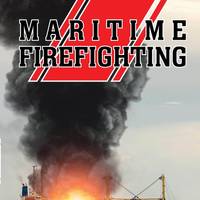
Maritime Firefighting by Captain Emil Muccin, USMS (ret.) and Matthew Bonvento is a comprehensive and modern guide for maritime professionals. It addresses the unique challenges of shipboard firefighting by integrating traditional methods with the latest advancements in equipment and procedures. This book effectively replaces outdated instruction aids by providing up-to-date, actionable knowledge. Using the IMO Model courses of Basic and Advanced Firefighting as a baseline, the authors take a deep dive into subjects that have not been explained in detail in previous books…
Obstructed Valve Sinks Towboat
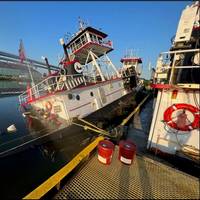
An obstructed check valve on a bilge pump led to the flooding and partial sinking of a towing vessel last year while moored at a shipyard near New Orleans, the National Transportation Safety Board reports.Marquette Transportation's vessel Joanne Marie was found partially submerged a day and a half after being moored and deactivated at the Bollinger Quick Repair Shipyard on the Harvey Canal. The vessel was unattended at the time. No injuries were reported and damage to the vessel was over $176…
US Coast Guard Clarifies Fire Safety Rules for Small Passenger Vessels
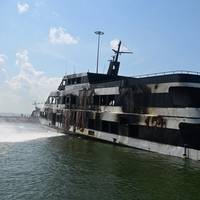
The U.S. Coast Guard published an interim rule on December 27, 2021, to implement Congressionally-mandated requirements for fire safety on “covered small passenger vessels” (CSPVs), as defined by 46 U.S.C. 3306(n). Congress adopted the statutory mandate in response to the fire and loss of 34 lives onboard the dive boat CONCEPTION off the California coast on 02 September 2019.The USCG has identified a need to clarify the reference in 46 CFR 175.110(c) with respect to fire detection…
NTSB Urges USCG to Remove Subchapter K Exemptions for Fire Safety
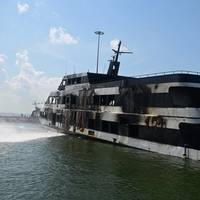
The National Transportation Safety Board (NTSB) recommended Tuesday that engine-room fire detection and fixed fire extinguishing systems be installed in small passenger vessels previously exempted from U.S. Coast Guard regulations in Subchapter K.The NTSB issued the recommendations after investigating an engine room fire aboard the Spirit of Norfolk during a sightseeing cruise near Naval Station Norfolk, Viriginia, on June 7, 2022, with 108 people on board. The fire was too large for the crew to fight, and the passengers and crew were evacuated to other vessels.
Car Battery Triggered Fire on Board Höegh Xiamen -NTSB
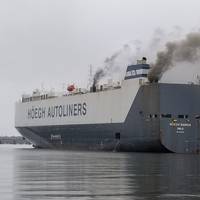
An electrical fault from an improperly disconnected battery in a used vehicle led to the fire aboard vehicle carrier Höegh Xiamen that resulted in $40 million worth of damages, the National Transportation Safety Board (NTSB) said Thursday.As a result of the investigation, NTSB issued eight safety recommendations to federal regulators and the companies involved in the accident.On June 4, 2020, while the Höegh Xiamen was in Jacksonville, Fla., the ship's crew noticed smoke coming from the ventilation housing while preparing to depart port for Baltimore, Md.
Top Maritime Trends of 2020: Tackling the Scourge of Containership Fires
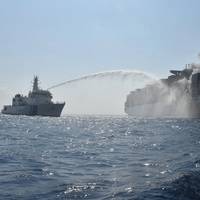
The proliferation of serious fires onboard container ships in recent years has shocked the shipping industry. Here we examine the causes and impact of such fires and the urgent efforts being made by a wide variety of stakeholders to solve this seemingly intractable problem.Over the last decade there has been a 70% fall in ship total losses[1]. This has been widely credited to long term improvements in ship safety management and loss prevention programs. Counter to this trend, there has been a substantial increase in the number of fires in containers carried onboard container and RoRo ships.
NTSB Issues Report on Passenger Vessel Casualty
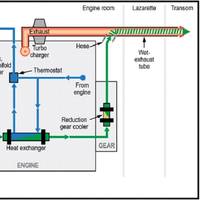
Insufficient Maintenance Program, Lack of Guidance Led to Passenger Vessel Fire. The National Transportation Safety Board determined during a public meeting held Tuesday that an insufficient preventative maintenance program and lack of guidance for responding to engine high-temperature conditions, led to the Jan. 14, 2018, fire aboard the small passenger vessel Island Lady, in the waters of the Pithlachascotee River, near Port Ritchey, Florida.The Island Lady was a 72-foot-long passenger vessel operated by Tropical Breeze Casino Cruz…
Shipbuilding in Spain: Astican & Astander
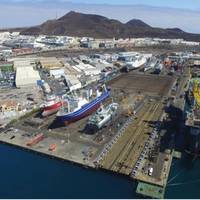
Pair of privately owned Spanish yards ready to assist Owners with IMO regulationsNew rules are always a driver for ship refit, and this truly is a transcendent time in maritime history, as rules regarding Ballast Water Management Systems and new emissions regulations are conspiring to create a lot of work for shipyards.As IMO has set a global limit for Sulfur in fuel oil used on board ships of 0.50% m/m (mass by mass) from 1 January 2020, Astander and Astican, the two busiest privately owned ship repair & conversion shipyards in Spain…
North P&I Club Guidelines on Minimising Risk from Ro-Ro fires
North P&I Club has published a new loss prevention briefing on how to prevent, detect and fight fires on roll-on-roll-off (ro-ro) vessels and car carriers. Such vessels are twice as likely to catch fire as other ships and vehicle-deck fires are notoriously difficult to contain and put out. The new 10-page briefing, which is free to download from the Club’s website, explains the risks of ro-ro and car carrier fires in detail. It then sets out a comprehensive series of recommendations covering training, maintenance, vigilance, reaction and procedures. Vehicle fires collectively account for a large number of fires but there are different sources of ignition.
Elcome Supplies Electronics for Abu Dhabi New Builds

Elcome International is supplying electrical switchboards, safety, monitoring and control systems for three vessels under construction at Abu Dhabi Ship Building (ADSB). Elcome’s scope of work included supply, installation and commissioning of main switchboards and electrical systems, bridge and engine room consoles, tank gauging and fire detection systems. The three vessels are being built for a customer in the Middle East for delivery in 2017. “These orders from ADSB represent a significant achievement in our growth as a major supplier for newbuilds as well as retrofits…
Is Your Crew Really Prepared?
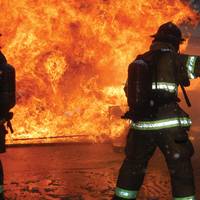
If you think training is expensive; try ignorance. In the ensuing years following the Exxon Valdez disaster, the maritime industry has made great strides in training mariners to prepare for, respond to and mitigate a multitude of emergencies aboard vessels. For example, the environmental performance of the marine industry itself has all but eliminated much of the oil that formerly entered the water through marine error or equipment failures. Nevertheless, the incidents with vessels that do occur, large and small, bring into question the effectiveness of the training.
Fire Detection from Fireboy-Xintex

Fireboy-Xintex Inc. offers a line of USCG Type Approved Fire Detection Systems for commercial vessels and recreational yachts. Marine Elite RSM Analog Addressable Fire Alarm Control Panels are available for hosting up to 256 fire detection devices on all Commercial and Recreational Marine applications. These control panels can also be expanded and networked to become part of larger systems. Elite RSM Control Panels are simple and easy to understand for installers, commissioning personnel and vessel owners and feature Apollo protocol smoke and heat detectors.
Autronica Installs Fire Detection System Aboard Carnival Cruise Vessel
Autronica Fire and Security AS has completed the first major refit project on a passenger vessel for its flagship AutroSafe 4 fire detection system. The refit of the fire detection system aboard Carnival Sunshine took place at the Fincantieri yard in Trieste, Italy, during April and May 2013. Called Carnival Destiny prior to its $155-million dollar makeover, the 3006 passenger capacity Carnival Sunshine launched on May 5, 2013. The renovations at Fincantieri included the addition of Carnival’s Fun Ship 2.0 dining, bar and entertainment features, and an additional 182 staterooms. Safety systems were also a key aspect of the renovations, with AutroSafe 4 chosen as one of the world’s most advanced maritime fire detection systems.
Approved Fire Detection Systems from Fireboy -Xintex
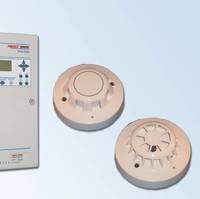
Fireboy-Xintex Inc. has recently announced their new line of USCG Type Approved Fire Detection Systems for commercial vessels and recreational yachts. Marine Elite RSM Analog Addressable Fire Alarm Control Panels are available for hosting up to 256 fire detection devices on all Commercial and Recreational Marine applications. These control panels can also be expanded and networked to become part of larger systems. Elite RSM Control Panels are simple and easy to understand for installers, commissioning personnel and vessel owners and feature Apollo protocol smoke and heat detectors.
Conoco To Build New Towboats
Conoco is building four new towboats with innovative safety, environmental and design improvements that set new standards for the inland towing industry. "We are raising the bar for towboat design, machinery and marine systems by constructing American Bureau of Shipping (ABS) class boats," said Karen Stacey, director of Conoco domestic marine. Contrary to the name, towboats actually "push" cargo barges along the Intracoastal Waterway and major rivers. The new towboats, being built by Orange Shipbuilding of Orange, Texas, will have safety enhancements such as CO2 extinguishing systems, fuel shutdowns, fire detection systems and fire fighting systems.
New Rule Upgrade Shields Towing Vessels
The U.S. Coast Guard's final rule on "Fire Protection Measures for Towing Vessels" is posted on the Federal Register dated August 28. The ruling fine tunes the fire protection measures for towing vessels implemented by an interim rule published on October 19, 1999, which is the result of public comments received. The changes clarify the comments for fuel shut-off valves, fuel-tank vents, design of fire-detection systems for engine rooms and safety orientations. These adjustments should lower the number and severity of injuries to crews; prevent damage to vessels, structures and other property, as well as protecting the environment. While the rule comes into force on September 27, 2000, owners of towing vessels will have until October 8, 2001 to install the required equipment.
Conoco Cuts Steel on Innovative Towboats
Conoco is building four new towboats that purportedly offer innovations in safety, environmental interaction, as well as design improvements that Conoco claims will set new standards for the inland towing industry. "We are raising the bar for towboat design, machinery and marine systems by constructing American Bureau of Shipping (ABS) class boats," said Karen Stacey, director of Conoco domestic marine. The new vessels, being built by Orange Shipbuilding of Orange, Texas, will have safety enhancements such as CO2 extinguishing systems, fuel shutdowns, fire detection systems and fire fighting systems. Environmental upgrades will include main propulsion engines that are compliant with the International Maritime Organization (IMO) and Environmental Protection Agency (EPA) emissions standards.
KMSS Signs Royal Caribbean Deal
Cruises Limited (RCCL), out of the Meyer Weft shipyard in Papenburg, Germany. The contract is worth $3.2 million in total. to leave the yard imminently. launched next year and in 2004. Each ship will be fitted with 4500 detectors and 1000 Control & Indication interface units for doors, fire dampers, low location lights, sprinkler valves and other systems. In addition, three Autromaster 5000 Color Graphic Indication and Control System units will be installed to control each ship's Fire Detection System. and smoke concentration to high voltage lines. all cruise ships should install local buzzers in all cabins. after 90 seconds, allowing the public address system to be heard. need for extra cabling, which drastically reduces the cost of installing this important safety measure.
KMSS Wins Contract for Fire Detection Systems
to supply Fire Detection Systems to four Radiance Class ships run by Royal Caribbean Cruises Limited (RCCL), out of the Meyer Weft shipyard in Papenburg, Germany. The four ship deal will see KMSS installing its Autrosafe Fire Detection System with Self Verifying Detectors on the currently sailing ‘M/S Radiance of the Seas’ and the M/S Brilliance of the Seas, which is due to leave the yard imminently. In addition, KMSS will also supply the same systems to two more Radiance Class ships currently in production, to be launched next year in 2004. Each ship will be fitted with 4500 detectors and 1000 Control & Indication interface units for doors, fire dampers, low location lights, sprinkler valves and other systems.
ConocoPhillips to Christen Towboat
Later this month, ConocoPhillips will christen a new towboat and, in the process, set higher standards for safety, environmental and design improvements within the inland towing industry. Antonio Valdes, general manager of ConocoPhillips’ marine division says, the new towboat is more capable and efficient, as well as reinforce environmental awareness. The ceremony christening Spirit which received classification from the American Bureau Of Shipping (ABS) will be held at Brady’s Landing in Pasedena, Texas, on January 30 at 10 a.m. Three additional towboats, Integrity, Liberty, Innovator, will be christened in March. The name of the first towboat to be christened is directly attributed to the company’s corporate values.








